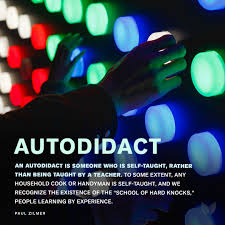White Paper: Fostering Engineering Innovation Through Autodidactic Principles
Abstract
In an era of relentless technological advancement, engineering innovation is paramount. This paper explores the pivotal role of autodidactic learning in driving such innovation. It examines how cultivating self-directed learning, leveraging diverse resources, and adopting effective methodologies empowers engineers to transcend traditional boundaries. We will explore specific use cases, analyze the challenges of autodidacticism, delve into the psychological aspects, discuss the role of companies, explore the future of self-directed learning, address ethical considerations, provide a curated reading list, and offer comprehensive references for further exploration.
1. Introduction: The Imperative of Continuous Learning
Engineering, by its very nature, is a field of constant evolution. The traditional model of formal education, while foundational, cannot fully equip engineers with the agility needed to navigate the ever-expanding landscape of knowledge and technology. Autodidacticism, the art of self-directed learning, emerges as a vital complement, fostering a culture of perpetual curiosity and adaptability. This paper argues that cultivating autodidactic practices within engineering is not merely beneficial but essential for driving innovation and maintaining a competitive edge.
2. The Autodidactic Engineer: A Profile of Self-Reliance
Definition:
The autodidactic engineer is a proactive learner, driven by intrinsic motivation to acquire knowledge and skills independently. They embrace challenges as opportunities for growth, leveraging diverse resources to expand their expertise.
Key Characteristics:
- Intrinsic Motivation and Curiosity
- Resourcefulness and Information Literacy
- Critical Thinking and Analytical Skills
- Problem-Solving and Experimentation
- Adaptability and Resilience
- Effective Time Management and Self-Discipline
3. Autodidactic Methods for Engineering Innovation: A Toolkit for Self-Directed Learning
Leveraging Online Resources:
- Massive Open Online Courses (MOOCs): Coursera, edX, MIT OpenCourseWare.
- Online Documentation and Tutorials: Manufacturer websites (Texas Instruments, Analog Devices), open-source project documentation (Arduino, Raspberry Pi).
- Online Forums and Communities: Stack Overflow, GitHub, Reddit.
Practical Experimentation:
- Hands-on Projects: Building and testing prototypes.
- Personal Labs and Makerspaces: Creating environments for experimentation.
- Open-Source Hardware and Software: FreeCAD, Arduino, Raspberry Pi.
Reading and Research:
- Technical Journals and Publications: IEEE Xplore, ScienceDirect.
- Classic Engineering Texts: Timoshenko's "Mechanics of Materials."
- Biographies of Innovators: Walter Isaacson's "Leonardo da Vinci."
Networking and Collaboration:
Industry conferences, online communities, mentorship.
4. The Role of Autodidacticism in Driving Innovation: Beyond Conventional Boundaries
- Rapid Skill Acquisition
- Creative Problem-Solving
- Adaptability to Change
- Personalized Learning
- Interdisciplinary Thinking
5. Use Cases: Autodidacticism in Action
- Use Case 1: The Transitioning Engineer (Software to AI): Utilizes MOOCs, practical projects, and online communities.
- Use Case 2: The Independent Hardware Innovator (IoT Device Development): Leverages datasheets, open-source hardware, and CAD software.
- Use Case 3: The Civil Engineer and Sustainable Practices (Green Building Integration): Enrolls in MOOCs, studies building codes, and researches new materials.
- Use Case 4: The Manufacturing Engineer and Robotic Automation (Process Improvement): Studies online resources, uses simulation software, and learns sensor integration.
6. Challenges of Autodidacticism and Mitigation Strategies
- Information Overload: Develop effective information filtering skills.
- Lack of Structure: Create structured learning plans.
- Lack of Feedback: Seek feedback from peers and mentors.
- Maintaining Motivation: Set achievable goals and track progress.
7. The Psychological Aspects of Autodidacticism: Cultivating the Learning Mindset
- Growth Mindset
- Metacognition
- Self-Efficacy
- Intrinsic Motivation
- Cognitive Flexibility
- Delayed Gratification
8. The Role of Companies in Fostering Autodidacticism: Creating a Learning Ecosystem
- Provide Access to Resources
- Encourage Peer Learning
- Promote Mentorship Programs
- Allocate Time for Learning
- Recognize and Reward Learning
- Create a Culture of Experimentation
9. The Future of Autodidacticism in Engineering: Emerging Trends and Technologies
- AI and Personalized Learning
- VR/AR
- Blockchain and Decentralized Learning
- Open-Source Everything
- Neuroscience and Cognitive Enhancement
- Increased Access to Remote Collaboration Tools
10. Ethics in Autodidactic Learning: Responsible Knowledge Acquisition and Application
- Intellectual Property and Plagiarism
- Bias and Misinformation
- Responsible Innovation
- Data Privacy and Security
- Equity and Accessibility
- Transparency
11. The Role of KeenComputer.com and IAS-Research.com in Engineering and Innovation
KeenComputer.com and IAS-Research.com serve as pivotal platforms for fostering engineering innovation through autodidactic principles.
KeenComputer.com:
- Provides access to cutting-edge research in IT and computational advancements.
- Offers online learning modules, tutorials, and interactive programming challenges.
- Facilitates collaboration through forums, research papers, and expert-led discussions.
- Encourages innovation in AI, data analytics, and software engineering.
IAS-Research.com:
- Focuses on interdisciplinary engineering research, bridging the gap between theory and application.
- Supports knowledge-sharing initiatives in automation, robotics, and sustainable engineering.
- Provides a platform for engineers to showcase independent projects and gain peer feedback.
- Promotes mentorship and knowledge exchange among autodidactic learners and industry experts.
By leveraging these platforms, engineers can enhance their learning experience, gain industry-relevant insights, and collaborate with like-minded innovators worldwide.
12. Curated Reading List for the Autodidactic Engineer
Core Self-Education Guides:
- Susan Wise Bauer's The Well-Educated Mind
- Scott Young's Ultralearning
- Cal Newport's Deep Work
Critical Thinking & Logic:
- Aristotle's Logic
- Edward de Bono's De Bono’s Thinking Course
- Nassim Nicholas Taleb's Fooled by Randomness
Social Science & Strategy:
- Sun Tzu's The Art of War
- Niccolò Machiavelli's The Prince
- Robert Wright's Non-Zero
Science & Evolution:
- Richard Dawkins' The Selfish Gene
- Nassim Nicholas Taleb's Antifragile
- V.S. Ramachandran's Phantoms in the Brain
History & Economics:
- Adam Smith's The Wealth of Nations
- Charles C. Mann's 1491
- Walter Scheidel's The Great Leveler
Ethics & Philosophy:
- Aristotle's Ethics
- Friedrich Nietzsche's Beyond Good and Evil
- John Rawls' A Theory of Justice
Literature & Creativity:
- Douglas Adams' Dirk Gently’s Holistic Detective Agency
- Umberto Eco's The Name of the Rose
- Frank Herbert's Dune
13. References
A comprehensive list of books and publications covering engineering, philosophy, psychology, and autodidactic learning principles.



